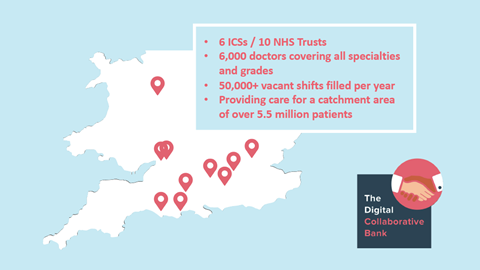Ahmed Shahrabani focuses on the newly emerging collaborative staff banks across the country, created in order to mitigate workforce challenges
With a looming workforce shortage, staff burnout, a pandemic backlog, and a widening health inequality gap, all happening against a cost-of-living crisis, the scale of pressure the health service is facing comes as no surprise. It is now crucial to redesign and future-proof our current models of care to deliver the best, equitable, sustainable, and consistent care for our patients whilst maintaining and growing a thriving workforce.
Sponsored by
This is a mammoth task requiring a multifaceted approach involving cross-government strategies and policies, funding, change management, and strong leadership across organisations. Although this won’t happen overnight, one trend already driving progress is the integration of health and social care. This was recently reinforced by the 2022 Health and Care Act, bringing collective responsibility and accountability on the forefront of improving our health and care services.
To address current workforce challenges, as per NHS England Improvement guidance, multiple collaborative banks are being created across the country. This is exciting as collaborative staff banks were historically perceived as a risk by NHS organisations, who since then have embraced collaboration, accelerated by the success of mobilising collective efforts during the pandemic. Being part of a collaborative staff bank offers various benefits including enhancing:
- Staff capacity: Increased shift fill rate, support in tackling waiting lists, reducing burden on recruitment and temporary staffing team, improving staff wellbeing
- Compliance: Reducing rate breaches/violations and increasing rate harmonisation
- Transparency: Enhancing the ability to plan shifts due to increased visibility of needs, gaps, and successes
- Financial savings: Reducing spend on agency
The result? Improved patient care whilst increasing agency of healthcare professionals.
Here at Locum’s Nest, we strongly believe in the power of a collaborative workforce and using technology as a support tool to facilitate it. Through our workforce solutions, we have enabled NHS trusts across the country to consistently achieve shift fill rates of more than 90 per cent, generating significant cost savings whilst empowering their employees.
Our Digital Collaborative Bank was initially a grassroots project led by Ashford and St Peter’s Hospitals Foundation Trust and Royal Surrey FT in 2017. Since its launch, it has grown to span six integrated care systems, including 10 NHS trusts, who now share a pool of more than 6,000 doctors covering all specialities and grades, filling more than 50,000 vacant shifts per year. This provides care for a catchment area for more than 5.5 million patients. Working together, we established tech-enabled staff bank services to make shifts more visible by removing practical barriers for staff moving between organisations and improve patient care hours.

More recently, we are supporting setting up the North Central London Medical Collaborative Bank across several trusts. And whereas this is an example of a staff bank that originated at a regional level, it can be replicated at a national level. If every trust started working together, significant savings in streamlining HR and finance payroll processes could take place. Our data shows that trusts working collaboratively have a fill rate of 5-10 per cent higher than an average trust working independently.
We believe in maximising the use of collaborative staff banks to support workforce challenges. We should not be asking our staff to be more resilient but designing resilient systems across our organisations that can withstand the ever-evolving healthcare landscape. The vision? One NHS. One, happy and thriving, Staff Bank.
If you’d like to know how Locum’s Nest can help you set up your own collaborative staff bank, please get in touch here.
We’re also excited to be part of the NHS Providers Annual Conference and Exhibition 2022 (15-16 November 2022), attend our panel session and come say hello.




























